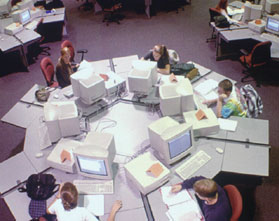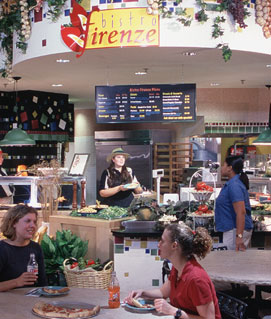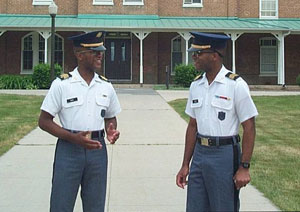The more things change...
...the more they stay the same. Or so goes the old adage. At Virginia Tech, some of the sights have changed and students learn, study, and live in different ways, but one still finds the same Hokie spirit and sense of tradition. So sit back and take a look at what's happening now around today's Virginia Tech.
by Sherry Bithell and Christina D. French '98, M.A. '01
How to become a Hokie
Applying for admission has come a long way since the days of pen-and-paper applications. Virginia Tech, the nation's first school to accept application fees online, now receives more electronic applications than any other school. Director of Undergraduate Admissions Karen Torgersen (elementary education '78, M.B.A. '86) says this process isn't just an indication of the university's high-tech prowess: "If we did not have electronic applications coming directly into our computer system, we wouldn't be able to finish processing applications by the time the students would need to enroll here in the fall." Last year, her office processed a record 18,800 undergraduate applications, and while it's too early to know for sure, the university will be close to that total this year.
Torgersen also has seen changes in the students since she first started working in admissions at Tech in 1986. For one thing, both African-American and Hispanic applications increased by about 30 percent last year, a trend she hopes continues.
Higher admissions standards than just five years ago also have made a difference in today's Tech students. Torgersen experienced the ramifications of these tougher standards two years ago when her daughter wasn't offered admission, which just goes to show that being the granddaughter of a former Tech president and daughter of the director of admissions doesn't matter when it comes to Tech's standards. "It was a tough time around the house for awhile," Torgersen admits. Her daughter worked hard her freshman year at another school and was accepted at Tech her sophomore year. "I was very proud of her for that," Torgersen says. "I think this shows that admission to Virginia Tech is not an entitlement--it's something that has to be earned."
"Is this going to be on the test?"
 It's a question that causes most instructors to flinch. But the Math Emporium, which since 1997 has helped educate large numbers of students in math classes, may make that question a thing of the past. The emporium serves students as a classroom, a study center, or a supplement to classes and provides unlimited practice tests and quizzes--giving students a chance to see what will "be on the test." It's a question that causes most instructors to flinch. But the Math Emporium, which since 1997 has helped educate large numbers of students in math classes, may make that question a thing of the past. The emporium serves students as a classroom, a study center, or a supplement to classes and provides unlimited practice tests and quizzes--giving students a chance to see what will "be on the test."
Open 24 hours a day and staffed by faculty members and tutors 14 hours a day, the emporium has "dramatically increased students' contact with those who can help them," says Director Michael Williams. "We're converting contact from the mode where an instructor delivers a 50-minute lecture to a contact that is completely one-on-one."
One math class, Math 1015 Pre-Calculus, is taught completely online and "exemplifies use of the Math Emporium, " says Williams. The class meets as a group once at the beginning of the semester to familiarize students with the emporium and provide them with the course expectations. After that, it's up to students to maintain a schedule of homework, quizzes, and tests administered electronically at the emporium. A comparison between the grades of students from two Math 1015 groups, one of which took the class in the traditional method, the other through the emporium, showed basically the same results. However, when grades were compared for students from the two groups who took the follow-up class, students from the online section did statistically better.
The math department plans to convert additional lower-level courses to the status of the Math 1015 course. For one thing, it's more cost-efficient--as a traditional class, Math 1015 would typically require 40-45 sections, requiring classroom space and many faculty members and graduate students. More importantly, Williams notes, it's beneficial to students. "They develop habits of self-reliance and discipline. It really shows the difference between active learning and passive learning."
No reservations necessary
The days of "mystery meat" are long gone at Virginia Tech, and nowhere is that more evident than the newest dining center, West End Market. More off-campus students buy meal plans than ever before, and Residential and Dining Programs (RDP) has received several prestigious awards from national college associations and Food Management magazine. Lori Greiner, customer advocate for RDP, explains that Tech is "bringing dining into the 21st century."
 What is 21st-century university food? At Tech, the answer is a Hokie Club that makes a Dagwood sandwich seem small; a perfectly cooked, made-to-order salmon filet; or a lobster bisque. Frank Beamer thinks the steaks are so much better at the market than anywhere else that he woos all his potential players there, including the recently signed Marcus Vick. What is 21st-century university food? At Tech, the answer is a Hokie Club that makes a Dagwood sandwich seem small; a perfectly cooked, made-to-order salmon filet; or a lobster bisque. Frank Beamer thinks the steaks are so much better at the market than anywhere else that he woos all his potential players there, including the recently signed Marcus Vick.
West End Market uses the marché concept, where independent, freestanding kitchens are islands within the seating areas, similar to an open-air French market where food preparation takes place in front of the customer. Venues include, among others, Leaf and Ladle, with its wide variety of salads and soups; Wired, an internet-connected coffee shop and bakery; and the Fighting Gobbler sports lounge, with big-screen televisions.
Tech is the first university to adopt the commercial marché concept, and John Price, West End Market manager, explains the rationale: "Students and parents want amenities now; the number of people who eat out has substantially increased. It used to be, 'We don't need all these choices, give us good solid food,' but now they are happy to pay four dollars for a restaurant-style meal that they would pay $10 for elsewhere."
When it comes to food, Tech sets the standard. "More than 20 colleges, universities, and contract food service organizations have come to Virginia Tech to tour West End Market as well as the other dining centers," Price says.
Today's esprit de corps
 The Virginia Tech Corps of Cadets is one of the university's most enduring traditions. Although membership is no longer required, the corps' spirit and purpose remain the same: "to refine leaders," says Senior Cadet Ernest Cage. The Virginia Tech Corps of Cadets is one of the university's most enduring traditions. Although membership is no longer required, the corps' spirit and purpose remain the same: "to refine leaders," says Senior Cadet Ernest Cage.
"It also builds your self-confidence by forcing you to do things you didn't think you could do," he adds, a sentiment echoed by his twin, Senior Cadet Ericke Cage. "This has given me experiences to look back on later in life when I'm faced with challenges and say, 'I've done something like that,'" Ericke says. "It gives you focus and sets a pattern for success." Day-to-day life in the corps gives cadets a chance to improve themselves mentally and physically, Ericke says, but "it's not like the perception some people get. We're not in here doing pushups and running around the quad all day!" While cadets do have to make some sacrifices, he notes that it's worth it.
The Cages are aware of the tradition in which they are participating. "You get the feeling you're part of something that's greater than you are," Ericke says. "We've heard alumni talk about their experience in the corps, and they get tears in their eyes, and that makes you realize you must be part of something special." Ernest adds, "it's kind of humbling" to talk to alumni about their experiences. "Many alumni made the ultimate sacrifice. It also pushes you to put your best foot forward--to ask yourself, 'Am I as good as they were?'"
The events of Sept. 11 have only solidified the commitment the Cages and their fellow cadets have to the corps, says Ericke. "It really brought into focus what our purpose is here, that you might at sometime be called to war. That this is real." Ernest agrees that "Sept. 11 reaffirmed my commitment to serve my country."
The twins are heading in different directions after graduation. Ernest will be commissioned as a logistics officer in the Air Force, while Ericke hopes to attend law school. "It'll be interesting to see how we do when we go our separate ways after we leave Tech," comments Ericke.
McComas Hall is working out
At McComas Hall, Tech's student-only recreational and health facility, "well-rounded student" doesn't refer to the one who put on a few pounds during winter break. A well-rounded student is part of the university's total wellness concept that values not just a student's academic performance, but also his or her physical and mental health.
In addition to housing recreational facilities, McComas is the home of the Schiffert Health Center and the Thomas E. Cook Counseling Center. Placing health care, counseling, and fitness services under the same roof provides opportunities to collaborate on programs that promote active life styles and healthy life choices, explains Bill Campion, director of recreational sports.
"As recently as 10 years ago, working out had very little resemblance to what we know as working out today," says Campion. McComas, which opened in 1998, caters to the new breed of gym-goers, who prefer self-directed workouts and modern gym equipment, including advanced weight training and cardiovascular machines. McComas has three gymnasiums; an elevated indoor track; two aerobic studios; an eight-lane, 25-yard swimming pool; locker and shower facilities; and three basketball/volleyball courts.
Campion says that fitness has become a way of life for Tech students. On a busy day, as many as 3,500 students have visited McComas Hall. Intramural student supervisor and architecture graduate student Ben Jordan-Downs explains the facility's popularity: "Working out can be a stress reliever and breaks up the monotony of a hectic class schedule."
McComas has been overcrowded almost since opening. "The vision for the future of the facility would be an expansion which would provide, in particular, more cardiovascular and weight training space and an opportunity to sell memberships to faculty and staff," says Campion. Even with the overcrowding, however, McComas seems to be working out.
Quality of life assurance
A top priority at Virginia Tech today is research. And it's more than an academic goal--research can affect lives around the world. Such is the case with Tech's biotechnology work. "The fact that you can't get a good tomato in February is not a problem," notes Glenda Gillaspy, assistant professor of biochemistry. "Instead, we're focusing on research that will improve the quality of life."
Gillaspy is working on replicating a gene that can be used to treat Type II diabetes in humans, one of the most common chronic conditions in the U.S. In this form of the disease, insulin present in the bloodstream cannot be absorbed into individual cells, resulting in high blood sugar that can cause blindness, nerve damage, kidney damage, and cardiovascular disease. The standard treatment is expensive, accounting for approximately 14 percent of all medical expenditures nationwide, or about $113 billion a year.
At the heart of Gillaspy's research lies D-chiro inositol, a metabolite scientists think helps the body process sugar from the bloodstream to individual cells. Studies show that D-chiro inositol also might help women with polycystic ovarian syndrome, which inhibits pregnancy. Gillaspy and collaborator Cynthia Gibas, assistant professor of biology, are using a computer to look at the structure of the Arabidopsis weed (the only plant for which scientists--have a complete genomic map) to look for the gene Gillaspy believes may explain how inositol is created. Finding the gene would allow researchers to reproduce the inositol.
A Richmond-based company, Insmed, currently produces an orally ingested form of D-chiro by chemically synthesizing itan expensive and difficult process, which is why Gillaspy wants to transgenically produce D-chiro in tobacco, a process that would provide widespread use for the plants. If successful, her work would make the D-chiro treatment available at a lower cost, which is especially important to developing nations. "If we succeed," she says, "it will be available to more people for less."
Residence halls for living
At the end of the day, students still head back to their residences to study--and, quite possibly, to sleep. But the ones who live on campus don't head back to a dorm. According to Cathy Turrentine, director of planning and assessment for student affairs, the word "dorm" is a thing of the past. "The saying now is, 'Dorms are for sleeping, residence halls are for living,'" she says.
Bringing the saying to life are Tech's nine theme housing communities, which include a wellness lifestyle-oriented group and another to acclimate first-year students to the university. One of the communities, the Residential Leadership Community (RLC), focuses on citizen leadership development for first and second-year students. The 219 student members of the community must take one leadership class each semester of their first year and serve the local community in their second year.
In 1999, the university's learning communities task force asked RLC students in Turrentine's leadership class to target additional communities that might benefit first-year students. The RLC student participants proposed the now up-and-running Biological and Life Sciences and Women in Engineering communities. Turrentine says one student in particular, Rebecca Weber (biology '02), helped develop the proposal for the Biological and Life Sciences Community and made sure it became a reality. Weber's effort, she adds, is an example of the way the RLC benefits students: "When Rebecca first walked into my class, she was afraid to talk to faculty members. By the next year, she was waltzing into the chair of the biology department's office to talk to him about the proposal."
Weber, a member of the RLC for all three years of eligibility and a teaching assistant for the Biological and Life Sciences Community, participates in several campus organizations. She agrees that the RLC has "given me opportunities to interact on the Virginia Tech campus in so many ways." After graduation, she will attend the Medical College of Virginia to study pediatrics or pediatric oncology. Travelling to Kenya with an RLC program, she says, gave her a firsthand glimpse of the importance of international health, especially for children.
Turrentine says Weber is a model example of the kind of education the university offers today's students. "I think she's a walking poster board for the outstanding combination of academic and co-curricular experiences that make Virginia Tech so special."
A rim of their own
Women's basketball has come a long way since it was first played as a varsity sport at Virginia Tech during the 1976-77 academic year. Today, the team has a 107-36 record under Coach Bonnie Henrickson and continues to attract legions of loyal Hokies. On Jan. 29, 6,069 fans--the largest crowd to see a women's game at Cassell Coliseum this season--cheered on the Hokies, who almost pulled out an upset of No. 1-ranked University of Connecticut. And the support seems to help. At the beginning of the 2001-02 season, the women had a 46-12 record at home, thanks to that sixth man--make that woman on the court.
|

